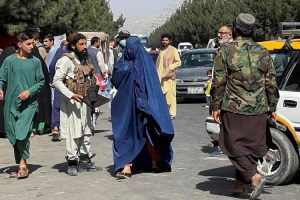23-11-2021
By SJA Jafri + Bureau Report
 KABUL/ ISLAMABAD: Women have been banned from appearing in television dramas in Afghanistan under new rules imposed by the Taliban government.
KABUL/ ISLAMABAD: Women have been banned from appearing in television dramas in Afghanistan under new rules imposed by the Taliban government.
Female journalists and presenters have also been ordered to wear headscarves on screen, although the guidelines do not say which type of covering to use.
Reporters say some of the rules are vague and subject to interpretation.
The Taliban seized power in Afghanistan in mid-August and many fear they are gradually imposing harsh restrictions.
The militant Islamist group, which took control following the departure of US and allied forces, almost immediately instructed girls and young women to stay home from school.
During their previous rule in the 1990s, women were barred from education and the workplace.
The latest set of Taliban guidelines, which have been issued to Afghan television channels, features eight new rules.
 They include the banning of films considered against the principles of Sharia – or Islamic law and Afghan values, while footage of men exposing intimate parts of the body is prohibited.
They include the banning of films considered against the principles of Sharia – or Islamic law and Afghan values, while footage of men exposing intimate parts of the body is prohibited.
Comedy and entertainment shows that insult religion or may be considered offensive to Afghans are also forbidden.
The Taliban have insisted that foreign films promoting foreign cultural values should not be broadcast.
Afghan television channels show mostly foreign dramas with lead female characters.
A member of an organization that represents journalists in Afghanistan, Hujjatullah Mujaddedi, said the announcement of new restrictions was unexpected.
He told the BBC that some of the rules were not practical and that if implemented, broadcasters may be forced to close.
The Taliban’s earlier decision to order girls and young women to stay home from school made Afghanistan the only country in the world to bar half its population from getting an education.
 The mayor of the capital, Kabul, also told female municipal employees to stay home unless their jobs could not be filled by a man.
The mayor of the capital, Kabul, also told female municipal employees to stay home unless their jobs could not be filled by a man.
The Taliban claim that their restrictions on women working and girls studying are “temporary” and only in place to ensure all workplaces and learning environments are “safe” for them.
Meanwhile, the World Food Program (WFP) in cooperation with the United States Agency for International Development (USAID) provided cash-aid to dozens of vulnerable families in west of Kabul on Monday.
WFP’s zone manager, Daoud Ghaznawi said that each family would receive 7,000 Afs in cash.
“We distribute the aids in two rounds. First, we have provided food materials. Now provide about 76 US dollars to each family,” he said.
The international organization including the UN have warned of severe humanitarian crisis in Afghanistan as the winter is approaching.
 The vulnerable families praised the provision of aids, calling on the international organization to ramp up their efforts to help the people who are in grave need.
The vulnerable families praised the provision of aids, calling on the international organization to ramp up their efforts to help the people who are in grave need.
“I ask the donors to support the hospitals, boot up their donations to overcome the existing poverty,” said Bibi Anisa, who was waiting on the line to receive the aids.
“I called on them to surge the rate of the aids in the future. This will help the people a lot better. This capable us to at least provide burning materials for the winter,” said Safiullah Khan, another aid receiver.
WFP provided donations to at least 9 million Afghans last year. According to the organization, 14 million people would be given aids in the ongoing year. The organization is also planning to provide aid for over 23 million people- that will also cost more than 220 million dollars.
 Pressmediaofindia
Pressmediaofindia




